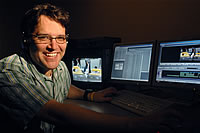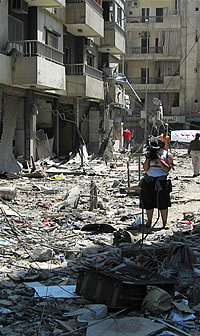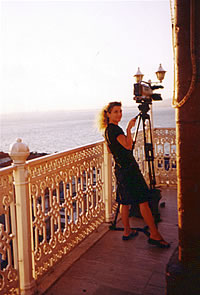 |
|||||||||||||||||

Behind the Camera
|
Jessica Schoenbaechler ('06 M.F.A.) brought attention to a beach crisis. James Lambert ('05 M.F.A.) revisited the location of a tragedy. And Patricio Salinas followed a heated primary race. These students' documentaries are just a few of the assignments that have been screened widely or received awards since the Department of Radio, Television and Film began its master of fine arts program in documentary film production in Fall 2004. Schoenbaechler's documentary about coastal erosion in Surfside, Beach Drive, was shown on KERA-TV in Dallas last August and on KUHT-TV, Houston's PBS affiliate, in April. From That Moment On, Lambert's film about Dallas' Dealey Plaza before and after the assassination of President John F. Kennedy, was named "Best Documentary by a Student" by the 2005 Deep Ellum Film Festival in Dallas.
Salinas' documentary, Texas 28, followed U.S. Rep. Ciro Rodriguez as he faced two challengers in a special Democratic primary for the 28th congressional district. The film was shown at the Dallas Video Festival and two other film festivals in Texas. In addition, work by UNT students has been recognized by the USA Film Festival, the Austin Film Festival, the NextFrame International Student Film Festival and even the prestigious Sundance Film Festival — where Video Junkie, which Lambert helped to edit as a student intern at Deep Ellum Pictures in Dallas, received a Special Jury Award. Early recognition The RTVF department's M.F.A. program is the only one in Texas focusing only on documentary film. Ben Levin, professor and director of graduate studies for the department, says he's particularly proud that two films by UNT students were among the eight finalists competing for the top documentary prize at NextFrame last August. UNT's program had more finalists than any other, including American University in Washington, D.C., Stanford University and UT-Austin. Levin says all of these universities have been well known for years for the documentary work produced in their programs. "We initially thought it would take longer for us to be recognized," he says. Up to eight new students can enroll in the three-year program each year. Currently, 17 students are enrolled, including six international students. As part of their degree program, the students create an original documentary every year. During their second year, they work on the crews for their classmates' films, gaining experience with preproduction skills, camera operation, lighting, audio recording and all facets of the editing process. They also take courses in documentary history, contemporary documentary and other subjects and produce a thesis film their last year. Multitasking in Beirut
Tania Khalaf, who plans to graduate in August, says learning all aspects of documentary film production resulted in her being able to shoot her thesis film in a war zone last summer. A Beirut native, Khalaf had returned to her home nation to start shooting a film about Lebanon's homeless children. When war began between Israeli forces and Shiite Lebanese Hezbollah forces, Khalaf changed the subject of her documentary to address how growing up during Lebanon's civil war influenced her life. For a month, she shot footage of last summer's war to include in the film. "I had only one friend helping me, but I was comfortable multitasking. From each project that you do in the M.F.A. program, you learn so many different things," she says. Levin says students are encouraged to use innovative filming and editing techniques such as different camera angles, first-person narration and animation in their documentaries. "We help them find styles that work with the stories they are telling and ask them to be willing to risk becoming personally involved with a subject," he says. Planes and angels
Jami Clayman tells the story of a decommissioned dual prop plane in her thesis film, OV-10: The Men, the Plane, the Missions. The OV-10 Bronco Association in Fort Worth hopes to restore the aircraft, says Clayman, who is graduating in August. "The men who flew them are excited to have their history preserved in the documentary. I take the subject seriously because they take it seriously," she says, adding that the "biggest hump" for documentary filmmakers is "finding a subject to carry the film." Levin says RTVF faculty members encourage students to film issues and subjects that interest them, and they share ideas from newspaper and magazine articles and from research being conducted by UNT faculty members in other departments.
Nefin Dinc ('05 M.F.A.), who produced television commercials in her native Turkey, says switching from creating advertisements to filming documentaries allowed her to focus more on topics that interest her. I Named Her Angel, her thesis film, follows a 12-year-old Turkish girl as she learns Mevlevism, a religion that is part of the Sufi/Mystic tradition of Islam. Mevlevis are known to most of the world as Whirling Dervishes. Dinc, who is now an assistant professor at the State University of New York in Fredonia, is currently creating a film about the relationship and misunderstandings between Turkey and Greece. Story ethics Mika Ferris ('07 M.F.A.) says a newspaper story about blind artist and UNT student John Bramblitt led to him contacting Bramblitt and creating a film about his painting technique. While working on the film, which was one of the finalists at last year's NextFrame festival, Ferris says he learned the importance of ethics in documentary filmmaking. "You're acting on someone's behalf, so you need to tell the story in a manner that is both acceptable to the subject and accurate," he says.
Leah Bell ('03, '06 M.F.A.) structured her storytelling in one of her films so that she wouldn't offend members of her own family. In ... And Then There Were Four, which took the top documentary prize at NextFrame in 2005, Bell followed her 77-year-old maternal grandmother through her days of raising four of her grandsons. The boys, who were 4, 5, 6 and 7 years old when Bell filmed the documentary, were in foster homes before their grandmother took them into her home in August 2003. "The biggest challenge of creating this film was making sure that it was acceptable to my own family, and that everyone agreed with the material covered," Bell says, adding that she put her young cousins before the camera because she decided "it was powerful for the boys to share their own story." Tracking tenure Bell is currently seeking a university teaching position and plans to continue creating films. Since she graduated from the M.F.A. program last August, she's taught at Stafford High School near her hometown of Houston. Levin says he expects that half of
the M.F.A. graduates will teach in Dinc says being a tenure-track professor has opened doors for her. "It's easier to approach people for grant money when you are a professor because they take you more seriously, and my university also helps me conduct research for a film," she says. Levin says other M.F.A. graduates will work for production companies or freelance, or will form their own companies. A special community Schoenbaechler works at a Dallas production company. She says she wants to gain experience in television documentary — producing episodes for series — and long-form documentary, learning from those who have been in the business for years. "We romanticize documentary filmmakers as single artists, but you're really more effective if you work with a team," she says, adding that over three years, the M.F.A. students develop "a special community." Khalaf agrees. She wants to teach to give back some of the support she received last summer when she could not return to UNT as planned because of the war. She says she received many e-mail messages and phone calls from students and faculty members. "It meant so much to me," says Khalaf, who eventually returned for the Fall 2006 semester. "Without this type of support, I wouldn't be the filmmaker I am today."
|
||||||||||||||||||||||||||||||||||||||||||||||||||||||||||||||||




